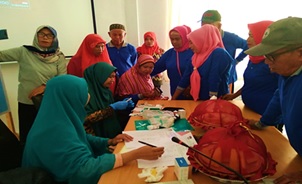Optimalisasi Self Care Management Diabetes pada Pasien Diabetes Mellitus di Puskesmas Parangloe Kabupaten Gowa Optimization of Diabetes Self Care Management in Diabetes Mellitus Patients at Parangloe Health Center, Gowa Regency
Main Article Content
Abstract
Management of Diabetes Mellitus (DM) aims to improve the quality of life for DM sufferers and reduce the risk of acute complications. Diabetes Self-Management Education (DSME) is a process that facilitates knowledge, skills, and abilities in self-care for DM patients based on evidence-based research. This activity aims to increase DM sufferers' knowledge and health status at Parangloe Health Center, Gowa Regency, South Sulawesi. The methods used are lectures, discussions, and demonstrations. The DSME administration was carried out in three sessions with 45 minutes and carried out diabetic foot gym training. Besides, the blood sugar level is checked at any time. The results achieved were an increase in knowledge of DM sufferers by 63.4% regarding definitions, classifications, signs and symptoms, risk factors, DM complications, diet, physical exercise, types and benefits of drugs given, foot care, and 96% being able to do foot exercises for diabetic. Also, there was an increase in the understanding and skills of cadres about DM self-care management. DM patients are also expected to check their blood glucose regularly and use the DM Self-Care Manual that has been provided.
Downloads
Article Details
Authors who publish with this journal agree to the following terms:
- Any article on the copyright is retained by the author(s).
- Author grant the journal, right of first publication with the work simultaneously licensed under a Creative Commons Attribution License that allows others to share work with acknowledgment of the work authors and initial publications in this journal.
- Authors are able to enter into a separate, additional contractual arrangements for non-exclusive distribution of published articles of work (eg, post-institutional repository) or publish it in a book, with acknowledgment of its initial publication in this journal.
- Authors are permitted and encouraged to post their work online (e.g., in institutional repositories or on their websites) prior to and during the submission process, as can lead to productive exchanges, as well as earlier and greater citation of published work.
- The article and any associated published material is distributed under the Creative Commons Attribution-ShareAlike 4.0 International License
References
Cooke, D., Bond, R., Lawton, J., Rankin, D., Heller, S., Clark, M., Speight, J., U.K. NIHR DAFNE Study Group. 2013. Structured type 1 diabetes education delivered within routine care: impact on glycemic control and diabetes-specific quality of life. Diabetes Care. 36(2):270-272. https://doi.org/10.2337/dc12-0080
Galicia-Garcia, U., Benito-Vicente, A., Jebari, S., Larrea-Sebal, A., Siddiqi, H., Uribe, K.B., Ostolaza, H., Martín, C. 2020. Pathophysiology of Type 2 Diabetes Mellitus. International Journal of Molecular Sciences. 21(17):6275. https://dx.doi.org/10.3390/ijms21176275
Gucciardi, E., Chan, V.W.S., Manuel, L., Sidani, S. 2013. A systematic literature review of diabetes self-management education features to improve diabetes education in women of Black African/Caribbean and Hispanic/Latin American ethnicity. Patient Education and Counseling. 92(2):235-245. https://doi.org/10.1016/j.pec.2013.03.007
Hermanns, N., Schmitt, A., Gahr, A., Herder, C., Nowotny, B., Roden, M., Ohmann, C., Kruse, J., Haak, T., Kulzer, B. 2015. The effect of a Diabetes-Specific Cognitive Behavioral Treatment Program (DIAMOS) for patients with diabetes and subclinical depression: results of a randomized controlled trial. Diabetes Care. 38(4):551-560. https://doi.org/10.2337/dc14-1416
International Diabetes Federation. 2018. IDF Western Pacific members: Indonesia. https://www.idf.org/our-network/regions-members/western-pacific/members/104-indonesia.html
Kementerian Kesehatan Republik Indonesia. Riset Kesehatan Dasar 2018. Jakarta: Kementerian Kesehatan Republik Indonesia. http://www.depkes.go.id/resources/download/general/Hasil%20Riskesdas%202018.pdf
Perkumpulan Endokrinologi Indonesia. 2015. Konsensus Pengelolaan dan Pencegahan Diabetes Melitus Tipe 2 di Indonesia 2015. Jakarta: Perkumpulan Endokrinologi Indonesia
Powers, M.A., Bardsley, J., Cypress, M., Duker, P., Funnell, M.M., Fischl, A.H., Maryniuk, M.D., Siminerio, L., Vivian, E. 2016. Diabetes Self-management Education and Support in Type 2 Diabetes: A Joint Position Statement of the American Diabetes Association, the American Association of Diabetes Educators, and the Academy of Nutrition and Dietetics. Clinical Diabetes. 34(2):70-80. https://dx.doi.org/10.2337/diaclin.34.2.70
Sugiyama, T., Steers, W.N., Wenger, N.S., Duru, O.K., Mangione, C.M. 2015. Effect of a community-based diabetes self-management empowerment program on mental health-related quality of life: a causal mediation analysis from a randomized controlled trial. BMC Health Services Research. 15:115. https://dx.doi.org/10.1186/s12913-015-0779-2
Tang, P.C., Overhage, J.M., Chan, A.S., Brown, N.L., Aghighi, B., Entwistle, M.P., Hui, S.L., Hyde, S.M., Klieman, L.H., Mitchell, C.J., Perkins, A.J., Qureshi, L.S., Waltimyer, T.A., Winters, L.J., Young, C.Y. 2013. Online disease management of diabetes: engaging and motivating patients online with enhanced resources-diabetes (EMPOWER-D), a randomized controlled trial. Journal of the American Medical Informatics Association. 20(3):526-534. https://doi.org/10.1136/amiajnl-2012-001263
